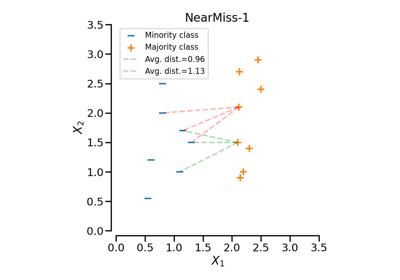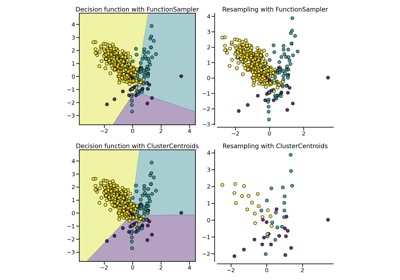NearMiss#
- class imblearn.under_sampling.NearMiss(*, sampling_strategy='auto', version=1, n_neighbors=3, n_neighbors_ver3=3, n_jobs=None)[source]#
Class to perform under-sampling based on NearMiss methods.
Read more in the User Guide.
- Parameters:
- sampling_strategyfloat, str, dict, callable, default=’auto’
Sampling information to sample the data set.
When
float, it corresponds to the desired ratio of the number of samples in the minority class over the number of samples in the majority class after resampling. Therefore, the ratio is expressed as \(\alpha_{us} = N_{m} / N_{rM}\) where \(N_{m}\) is the number of samples in the minority class and \(N_{rM}\) is the number of samples in the majority class after resampling.Warning
floatis only available for binary classification. An error is raised for multi-class classification.When
str, specify the class targeted by the resampling. The number of samples in the different classes will be equalized. Possible choices are:'majority': resample only the majority class;'not minority': resample all classes but the minority class;'not majority': resample all classes but the majority class;'all': resample all classes;'auto': equivalent to'not minority'.When
dict, the keys correspond to the targeted classes. The values correspond to the desired number of samples for each targeted class.When callable, function taking
yand returns adict. The keys correspond to the targeted classes. The values correspond to the desired number of samples for each class.
- versionint, default=1
Version of the NearMiss to use. Possible values are 1, 2 or 3.
- n_neighborsint or estimator object, default=3
If
int, size of the neighbourhood to consider to compute the average distance to the minority point samples. If object, an estimator that inherits fromKNeighborsMixinthat will be used to find the k_neighbors. By default, it will be a 3-NN.- n_neighbors_ver3int or estimator object, default=3
If
int, NearMiss-3 algorithm start by a phase of re-sampling. This parameter correspond to the number of neighbours selected create the subset in which the selection will be performed. If object, an estimator that inherits fromKNeighborsMixinthat will be used to find the k_neighbors. By default, it will be a 3-NN.- n_jobsint, default=None
Number of CPU cores used during the cross-validation loop.
Nonemeans 1 unless in ajoblib.parallel_backendcontext.-1means using all processors. See Glossary for more details.
- Attributes:
- sampling_strategy_dict
Dictionary containing the information to sample the dataset. The keys corresponds to the class labels from which to sample and the values are the number of samples to sample.
- nn_estimator object
Validated K-nearest Neighbours object created from
n_neighborsparameter.- nn_ver3_estimator object
Validated K-nearest Neighbours object created from
n_neighbors_ver3parameter.- sample_indices_ndarray of shape (n_new_samples,)
Indices of the samples selected.
Added in version 0.4.
- n_features_in_int
Number of features in the input dataset.
Added in version 0.9.
- feature_names_in_ndarray of shape (
n_features_in_,) Names of features seen during
fit. Defined only whenXhas feature names that are all strings.Added in version 0.10.
See also
RandomUnderSamplerRandom undersample the dataset.
InstanceHardnessThresholdUse of classifier to undersample a dataset.
Notes
The methods are based on [1].
Supports multi-class resampling.
References
[1]I. Mani, I. Zhang. “kNN approach to unbalanced data distributions: a case study involving information extraction,” In Proceedings of workshop on learning from imbalanced datasets, 2003.
Examples
>>> from collections import Counter >>> from sklearn.datasets import make_classification >>> from imblearn.under_sampling import NearMiss >>> X, y = make_classification(n_classes=2, class_sep=2, ... weights=[0.1, 0.9], n_informative=3, n_redundant=1, flip_y=0, ... n_features=20, n_clusters_per_class=1, n_samples=1000, random_state=10) >>> print('Original dataset shape %s' % Counter(y)) Original dataset shape Counter({1: 900, 0: 100}) >>> nm = NearMiss() >>> X_res, y_res = nm.fit_resample(X, y) >>> print('Resampled dataset shape %s' % Counter(y_res)) Resampled dataset shape Counter({0: 100, 1: 100})
Methods
fit(X, y, **params)Check inputs and statistics of the sampler.
fit_resample(X, y, **params)Resample the dataset.
get_feature_names_out([input_features])Get output feature names for transformation.
Get metadata routing of this object.
get_params([deep])Get parameters for this estimator.
set_params(**params)Set the parameters of this estimator.
- fit(X, y, **params)[source]#
Check inputs and statistics of the sampler.
You should use
fit_resamplein all cases.- Parameters:
- X{array-like, dataframe, sparse matrix} of shape (n_samples, n_features)
Data array.
- yarray-like of shape (n_samples,)
Target array.
- Returns:
- selfobject
Return the instance itself.
- fit_resample(X, y, **params)[source]#
Resample the dataset.
- Parameters:
- X{array-like, dataframe, sparse matrix} of shape (n_samples, n_features)
Matrix containing the data which have to be sampled.
- yarray-like of shape (n_samples,)
Corresponding label for each sample in X.
- Returns:
- X_resampled{array-like, dataframe, sparse matrix} of shape (n_samples_new, n_features)
The array containing the resampled data.
- y_resampledarray-like of shape (n_samples_new,)
The corresponding label of
X_resampled.
- get_feature_names_out(input_features=None)[source]#
Get output feature names for transformation.
- Parameters:
- input_featuresarray-like of str or None, default=None
Input features.
If
input_featuresisNone, thenfeature_names_in_is used as feature names in. Iffeature_names_in_is not defined, then the following input feature names are generated:["x0", "x1", ..., "x(n_features_in_ - 1)"].If
input_featuresis an array-like, theninput_featuresmust matchfeature_names_in_iffeature_names_in_is defined.
- Returns:
- feature_names_outndarray of str objects
Same as input features.
- get_metadata_routing()[source]#
Get metadata routing of this object.
Please check User Guide on how the routing mechanism works.
- Returns:
- routingMetadataRequest
A
MetadataRequestencapsulating routing information.
- get_params(deep=True)[source]#
Get parameters for this estimator.
- Parameters:
- deepbool, default=True
If True, will return the parameters for this estimator and contained subobjects that are estimators.
- Returns:
- paramsdict
Parameter names mapped to their values.
- set_params(**params)[source]#
Set the parameters of this estimator.
The method works on simple estimators as well as on nested objects (such as
Pipeline). The latter have parameters of the form<component>__<parameter>so that it’s possible to update each component of a nested object.- Parameters:
- **paramsdict
Estimator parameters.
- Returns:
- selfestimator instance
Estimator instance.




